Dihua is a relatively quiet street lined with textile stores and traditional pharmacies. That is, until two weeks before the Lunar New Year when local vendors spill out of their storefronts to set up shop on the walkway.
This narrow street, located near the Danshui River in Taipei's Dadaocheng District, turns into a sea of shoppers, merchants and bins packed with an array of savory and sweet holiday snacks. The traditional market is a popular destination for Taipei residents to do their New Year shopping and provides a viable option for temporary employment.
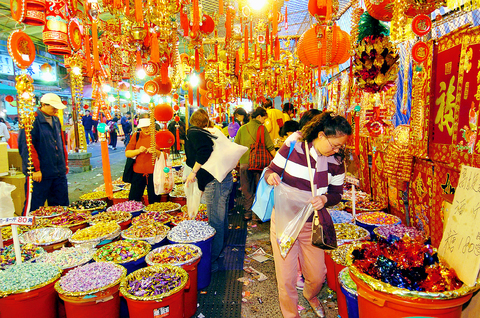
PHOTOS: GEORGE TSORNG, TAIPEI TIMES
Zheng You-cheng (
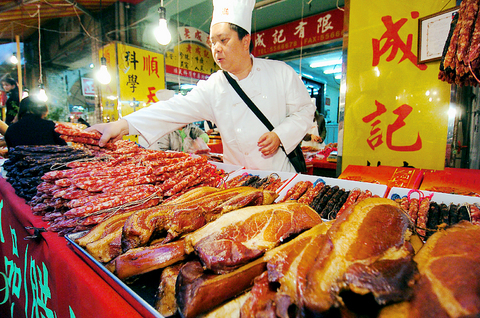
"The days are long and standing for 12 or more hours is hard work. But I like this job because I meet different people. I can even practice my English with foreigners."
Like Zheng, most store employees are students working during their winter vacations and earn NT$80 to NT$100 per hour. Although it sounds low, the wage is reasonable compared with minimum wages paid in a retail service industry job, which average at NT$70 per hour.
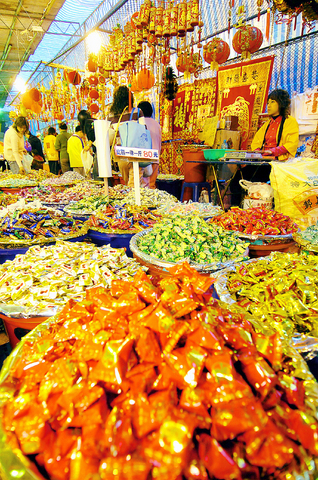
From a consumer's perspective, the area provides a one-stop shop for all New Year necessities. The goods range from candy, nuts, dried fish, fruit and vegetables to Chinese herbs and teas and even decorations. Most customers flock to Dihua Street to shop, yet the traditional southern Fujan-style architecture, red lanterns and foodstuffs have also made it a tourist attraction. Guided tours organized by expatriate clubs bring visitors to the market, and this year Taipei European School got into the spirit by setting up its own mini Dihua Street to teach students about the significance of the holiday market and the history of the street itself.
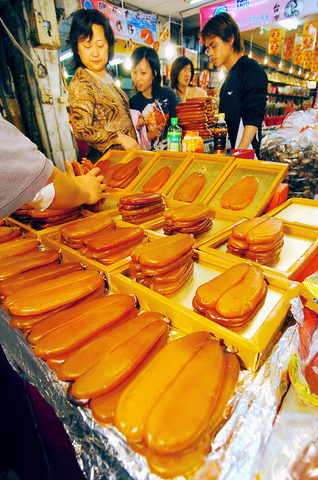
During the mid-1800s, goods from China would arrive by ship at the Dadaocheng port in Taiwan. Imported silk, medicine and artwork would be traded for local rice, sugar and produce. Dihua Street's proximity to the port made it the sensible location to sell the imported goods, so it became the busiest market in Taiwan.
Little trading takes place there now, but the history is still apparent. When looking down Minsheng West Road towards Danshui River, one of the original four stone gateways to the city is visible. The first pharmacy and one of the oldest buildings on Dihua, Sheng Ji (
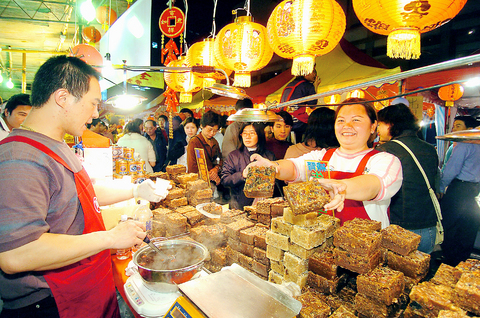
Considering medicine is not a holiday necessity, shops like Sheng Ji do not always benefit from the increase of holiday shoppers, said its proprietor Huang Ming-wo (
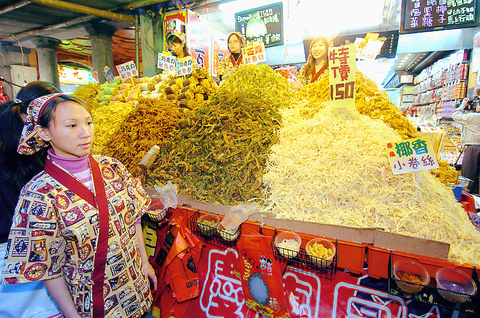
Mr Wong (
Although it was a little early to estimate how business would fare on the official opening last Tuesday, many shop attendants said they were witnessing a higher turnout than in the previous two years.
Prices are not set but they tend to be similar among the vendors. Bargaining is allowed and on some items, which have been marked up to twice regular prices, it is required. Other goods, however, cost less than they would at a franchise supermarket. The standard measurement is one jin (
As shop attendants vie for customers, they offer endless samples and assure all the while that tasting does not oblige one to make a purchase. "It's not a problem to sample. But when some people take advantage of the situation and grab a handful of candy as they walk by, that's annoying," Wong said.
Some samples never reach the mouths of their takers, and they shouldn't. According to television news reports, originating with the Consumers' Foundation (
In response to the findings, a news report that aired on Wednesday cited three of the Consumers' Foundation's recommendations: Avoid purchasing unfamiliar brand names, be wary of dried products that are "too white or too pretty," and make sure to follow all food preparations accurately.
Reaching for a fluorescent-colored, yogurt-covered raisin, Wu Yu-lan (
"Ordinarily I go to the traditional market near my home, or a supermarket, but this feels more festive, like Chinese New Year is on its way."
Watching Wu's hand rest on the pile of raisins, it seemed the real danger might not be importing spoiled foodstuff, but the potential hazards of sampling items that have already been pawed by a thousand hands. And given the number of daytime visitors at the market, it doesn't seem that the news warnings are a major threat to business this year.
The other complaint, cited by visitors, was noise pollution, particularly the megaphones used to lure in customers, which often has the opposite effect. Lack of trash bins was also noted, and as paper cups, candy wrappers and discarded samples find their way onto the ground, the street begins to look a mess.
A government-hired private company employs temporary workers to tidy the streets, and much like the students, this 24-hour service provides an opportunity for seasonal work. The day is split into two shifts and sweepers earn NT$100 per hour, said Mrs Yang, who saw a wanted ad in a newspaper.
When asked her opinion on whether people are inconsiderate or lazy, she replied, "You can't expect someone to hang on to empty cups. If there is no trash bin in sight, people use the ground. The best solution is to have bins near every vendor. People need them," Yang said.
For your information :
What: Lunar New Year Holiday shopping on Dihua Street (
When: Daily from 9am to midnight. Until Feb. 8.
How to get there: Traffic restrictions are in effect, leaving little alternative to public
transportation. The easiest way to get to Dihua Street is by MRT to Shuanglian station. From exit number 2, walk west down Minsheng West Road (15 minutes). Alternatively, there is a special Lunar New Year Shop-Around bus 518 running from the station directly to the street.

In the March 9 edition of the Taipei Times a piece by Ninon Godefroy ran with the headine “The quiet, gentle rhythm of Taiwan.” It started with the line “Taiwan is a small, humble place. There is no Eiffel Tower, no pyramids — no singular attraction that draws the world’s attention.” I laughed out loud at that. This was out of no disrespect for the author or the piece, which made some interesting analogies and good points about how both Din Tai Fung’s and Taiwan Semiconductor Manufacturing Co’s (TSMC, 台積電) meticulous attention to detail and quality are not quite up to

April 21 to April 27 Hsieh Er’s (謝娥) political fortunes were rising fast after she got out of jail and joined the Chinese Nationalist Party (KMT) in December 1945. Not only did she hold key positions in various committees, she was elected the only woman on the Taipei City Council and headed to Nanjing in 1946 as the sole Taiwanese female representative to the National Constituent Assembly. With the support of first lady Soong May-ling (宋美齡), she started the Taipei Women’s Association and Taiwan Provincial Women’s Association, where she

It is one of the more remarkable facts of Taiwan history that it was never occupied or claimed by any of the numerous kingdoms of southern China — Han or otherwise — that lay just across the water from it. None of their brilliant ministers ever discovered that Taiwan was a “core interest” of the state whose annexation was “inevitable.” As Paul Kua notes in an excellent monograph laying out how the Portuguese gave Taiwan the name “Formosa,” the first Europeans to express an interest in occupying Taiwan were the Spanish. Tonio Andrade in his seminal work, How Taiwan Became Chinese,

Mongolian influencer Anudari Daarya looks effortlessly glamorous and carefree in her social media posts — but the classically trained pianist’s road to acceptance as a transgender artist has been anything but easy. She is one of a growing number of Mongolian LGBTQ youth challenging stereotypes and fighting for acceptance through media representation in the socially conservative country. LGBTQ Mongolians often hide their identities from their employers and colleagues for fear of discrimination, with a survey by the non-profit LGBT Centre Mongolia showing that only 20 percent of people felt comfortable coming out at work. Daarya, 25, said she has faced discrimination since she